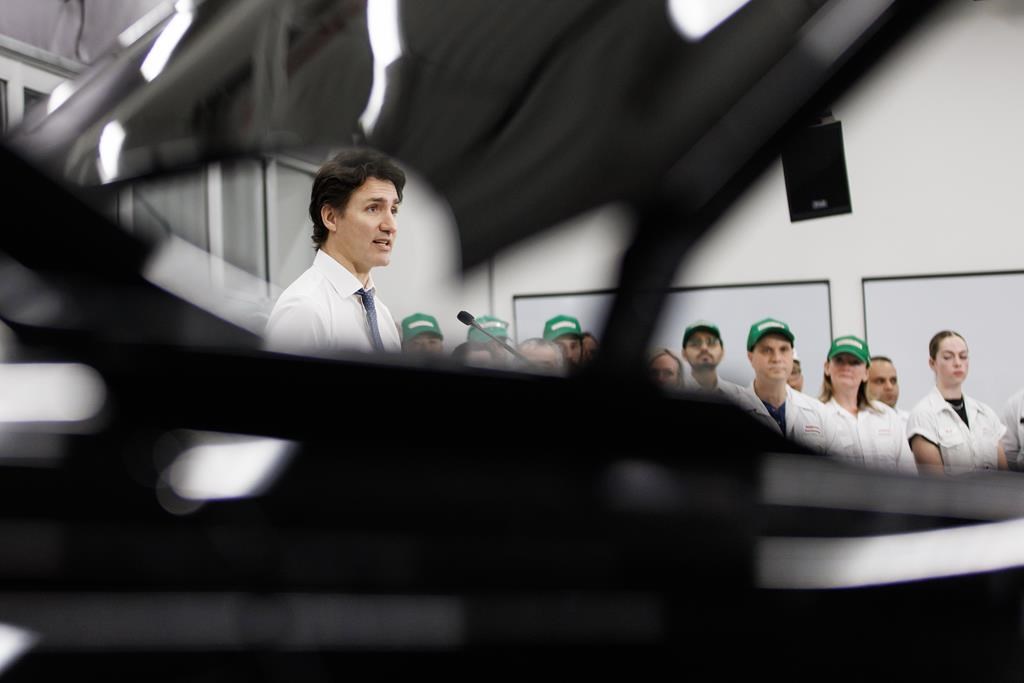Harper says he needs a majority mandate to fend off Quebec separatists
Posted April 17, 2011 8:52 pm.
This article is more than 5 years old.
Add the returning spectre of a Quebec referendum to the growing list of reasons Stephen Harper is using to make a pitch for a majority mandate.
Liberal Leader Michael Ignatieff blasted the Conservative leader Sunday for waging a campaign of fear to win that mandate.
The broadside came after Harper told supporters in Richmond, B.C. that now was not the time for a weak minority because that is precisely what the forces of separation in Quebec are hoping for.
“Step 1 is to weaken the country, have a weak government in Ottawa, and that is another reason we believe Canadians must choose a strong, stable, national Conservative majority government,” Harper said.
“The choice is not a coalition in the abstract. The choice is very clear. It is between having a weak Liberal government that will be propped up in power by the NDP and the Bloc Quebecois or having a strong Conservative majority.”
At an afternoon townhall in nearby North Vancouver, Ignatieff told supporters Canadians have nothing to fear from their “fellow citizens” in Quebec.
National unity has been a minor theme in the current federal campaign, but it arose anew Saturday after Parti Quebecois Leader Pauline Marois, who is ahead in provincial polls, won a resounding 93.1 per cent confidence vote from the normally fractious party.
It is natural for Marois and Bloc Quebecois Leader Gilles Duceppe to try and make political hay out of the event, Ignatieff said, but Harper had gone too far.
“The man is selling fear from one end of the country to other,” he said of Harper.
“Fear of democracy, fear of elections, fear of instability and now, the latest thing he pulls out of the air, is fear of sovereignty. We have nothing to fear here.”
Ignatieff also delivered one of his best lines in the campaign countering Conservative boasting about how well Canada had fared during the recession.
Noting the Conservatives owed their success to the economy and surplus budgets they inherited from previous Liberal governments, Ignatieff equated Harper to “Yoko Ono claiming credit for the Beatles.”
The two rivals spent most of the weekend in British Columbia, a key battleground in the May 2 vote than may determine whether Harper can win the first Tory majority since Brian Mulroney earned four years in power in 1988.
Harper’s main objective Sunday was courting immigrant voters by renewing his pledge to crack down on human smuggling.
Ignatieff’s returned to the issue of health care — an issue the Liberals believe they can score points on the Conservatives.
The party is currently airing the most negative ads of its campaign, trying to depict Harper as the leader most likely to preside over the demise of medicare.
Within 60 days of a Liberal government taking power, Ignatieff said, he’d convene a meeting of the provinces and territories to begin hammering out a new health-care accord to replace the current agreement which expires in 2014.
Ignatieff brought former Liberal prime minister Paul Martin along with him to hammer home the contrast.
Martin was in charge when the current federal-provincial health accord was signed in 2004. Ignatieff said that agreement set the stage for health-care reforms and a decade of stable funding.
“Harper gets into government and he doesn’t take any leadership in health for five years — nothing,” Ignatieff said.
“He puts the six per cent in, but there’s no leadership to improve the system, to work together to make the system work more effectively.”
Both the Liberals and the Tories have promised to maintain annual funding increases for health care at six per cent beyond the end of the current agreement three years from now.
The Conservative-Liberal battle of B.C. took some of the spotlight off NDP Jack Layton, who was heading into the weekend as the man with the momentum following the televised leaders’ debates — if polls are to be believed.
But Layton’s message was muddled Sunday by an offhand comment made by his sister Nancy, who was overheard telling a voter that Layton had his hip replaced.
Layton, who has been dogged by questions about his health almost from the outset of the campaign, tried to set the record straight.
“It’s not a hip replacement,” he said at a campaign stop in Halifax, chalking up his sister’s mistake to “inter-family confusion.”
“I’ll have to send her the X-ray.”
Aside from using a cane, Layton — who often bounds onto the stage at campaign rallies — has shown few signs of wear and tear despite the long hours and gruelling travel of non-stop campaigning.
At an afternoon event in Bridgewater, N.S., Layton said Canadians shouldn’t fool themselves into thinking they’ll get change if they vote for Ignatieff.










